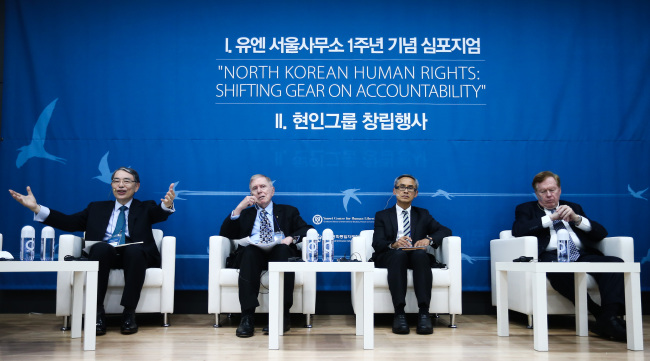Experts from international agencies and academia on Monday called for a more systematic and long-term solution to resolve North Korea’s human rights violations, looking beyond the naming-and-shaming tactics against its ruler.
Marking the first anniversary of its launch, the U.N. High Commissioner for Human Rights’ Seoul office brought together dozens of specialists on human rights, international law and North Korea for a one-day symposium.
Michael Kirby, chair of the U.N. Commission of Inquiry and a retired Australian Supreme Court justice, backed Seoul’s ambassador for human rights Lee Jung-hoon’s suggestion of a “large-scale, grassroots campaign” against the crimes against humanity in North Korea as a way to maintain momentum following the panel’s 2014 historic study.
“It is always tempting to target Kim Jong-un as the ultimate culprit,” Kirby said, though he noted that an exercise of jurisdiction such as by the International Court of Justice over the perpetrators could have a key role in enforcing a “dramatic change” in the isolated country.
 |
Participants speak at a symposium hosted by the U.N. High Commissioner for Human Rights at its Seoul office on Monday. From left are Song Sang-hyun, a former president of the International Criminal Court; Michael Kirby, chair of the U.N. Commission of Inquiry; Vitit Muntarbhorn, a former U.N. special rapporteur on North Korea; and Robert King, U.S. Special Envoy for North Korea Human Rights. (Yonhap) |
Remko Breuker, a professor in Korean studies at Leiden University in the Netherlands, echoed Kirby’s view. “We shouldn’t just look at symbolic accountability. ... We need to look at the architect of the system.”
Greg Scarlatoiu, executive director at the Washington-based Committee for Human Rights in North Korea, also stressed the need to broaden the targets to include other top officials such as Kim’s sister Kim Yo-jong, who is believed to be serving as a deputy director at the ruling Worker’s Party.
“It is very important to adopt an approach toward accountability that relies on full and deep understanding of the mechanism on human rights denial from the top down,” Scarlatoiu said.
The COI report called for Kim and other offenders to be brought to the ICC in The Hague or an ad hoc tribunal set up by the U.N.
The latter option may be more realistic, as Pyongyang is not a signatory of the treaty that created the ICC, and even if it was, China would most likely veto any referral.
The special court, too, would require a convoluted process given past cases, involving a multitude of U.N. Security Council resolutions and a majority vote at the General Assembly.
Though chances for a referral remain slim, its existence may yet work as a robust deterrence against the regime, said Ko Young-hwan, vice president of the Institute for National Security Strategy in Seoul.
The former Pyongyang diplomat who defected 25 years ago called for the international community to continue labeling the young leader as the chief instigator of the right breaches, which would prompt other executives to try to improve living conditions, albeit through stopgap measures.
“North Korean authorities have not had any concept of human rights until the U.N. COI brought up the accountability issues involving the leadership,” he said.
“The more we say about bringing Kim to justice, the more efforts the North’s officials and diplomats will make to dilute his responsibilities, scaling down prison camps, feeding people better and so forth.”
Song Sang-hyun, a former president of the International Criminal Court, urged member states to take steps to better implement the Rome Statute, the ICC’s founding document, and provide necessary public education.
“What we need to achieve eventually is a system that not only internalizes the Rome Statute but makes the crimes not only punishable but also simply not acceptable in society everywhere,” he said.
Later in the day, the office held a launch ceremony for the “Sages Group” on North Korea human rights, which also includes U.N. Special Rapporteur Marzuki Darusman, U.S. Special Envoy for North Korea Human Rights Robert King and other former and incumbent officials.
They will gather regularly every year to review the communist state’s human rights conditions and recommend the outcome to the U.N. and member countries.
By Shin Hyon-hee (
heeshin@heraldcorp.com)





![[Exclusive] Hyundai Mobis eyes closer ties with BYD](http://res.heraldm.com/phpwas/restmb_idxmake.php?idx=644&simg=/content/image/2024/11/25/20241125050044_0.jpg)

![[Herald Review] 'Gangnam B-Side' combines social realism with masterful suspense, performance](http://res.heraldm.com/phpwas/restmb_idxmake.php?idx=644&simg=/content/image/2024/11/25/20241125050072_0.jpg)
